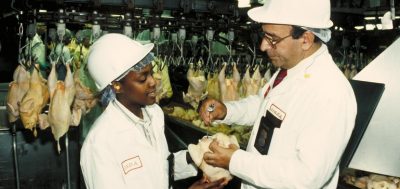As Coronavirus Spreads in Meat Plants, Nearly 200 USDA Inspectors Test Positive

As coronavirus has spread rapidly among meat plants across the country, it’s not just the workers that are getting infected. Many people have strongly criticized the industry’s response for waiting too long to implement safety precautions and close processing plants as thousands have tested positive for coronavirus and at least 20 workers have died. But the inspectors checking these facilities and their products are not immune to the virus either.
FSIS inspectors are classified as essential workers, so they have continued to travel to monitor these facilities. But as the plants become coronavirus hot spots, reports have shown the inspectors haven’t been able to protect themselves adequately.
A FSIS inspector interviewed in Government Executive said moving inspectors exposed to an outbreak at one plant to another location isn’t safe because they could then be coronavirus carriers and further the spread.
Last month, Politico reported many of the inspectors were expected to find their own protective gear since USDA wasn’t able to secure face masks for all of its workers. In April, USDA said it would give a $50 reimbursement for inspectors to find their own, according to Politico. But now the department says it has enough masks.
Since more than 300 inspectors have either tested positive or self quarantined, that can make it challenging to inspect every plant. Recent closures, however, could make that easier. More than 20 meatpacking plants, including facilities run by Tyson Foods, JBS USA, Smithfield Foods and Cargill, have closed temporarily or indefinitely following pressure from local authorities and their own workforce. But as plants start to reopen, the smaller FSIS workforce could weigh on meat processors.
Two weeks ago, President Donald Trump signed an executive order declaring meat plants as “critical infrastructure” using the Defense Production Act to keep these facilities open and help prevent shortages. But as plants reopen, inspectors will need to travel to them and there is still risk of the virus continuing to spread.
The new executive order puts USDA Secretary Sonny Perdue in charge of coordinating with companies to reopen or continue operations during the pandemic. Perdue previously said he anticipated plants would reopen in “days not weeks.” Already, a major beef and pork plant for Tyson reopened with limited production last week after nearly 900 of its workers tested positive. A Smithfield plant in Sioux Falls, South Dakota, where hundreds contracted the virus, also reopened with limited staff last week.
Several labor groups have criticized the USDA, asking if it can’t protect its own employees from the virus, how can it protect workers? ”The health and safety of federal inspectors and plant workers is in the hands of an industry that the administration is now pressuring to stay open, no matter the costs,” Paula Schelling, acting president of the American Federation of Government Employees Council 45, which represents 6,500 federal food inspectors, said in a release.
While the Centers for Disease Control and Prevention and Occupational Safety and Health Administration created guidelines calling for distancing and other safety measures, there are no requirements forcing companies to reconfigure facilities. And if inspectors continue to catch the virus traveling from plant to plant, they could risk spreading it themselves, or if even more get sick, then there may not be enough inspectors to properly check each facility. It’s just the latest hurdle to challenge the meat industry hit hard during the recent pandemic.
*
Note to readers: please click the share buttons above or below. Forward this article to your email lists. Crosspost on your blog site, internet forums. etc.
Featured image: U.S. Department of Agriculture. Retrieved from Flickr.

